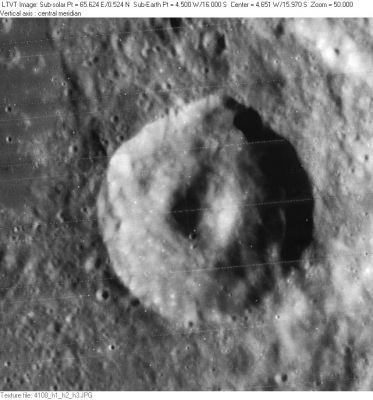Alpetragius
Contents
Alpetragius and its Egg-in-a-nest (pronounced central peak)
|
Lat: 16.0°S, Long: 4.5°W, Diam: 39 km, Depth: 3.9 km, Rükl: 55 |
LO-IV-108H
Alpetragius is in the center. The 5-km crater directly above it (near the top margin) is Alphonsus X'. A part of Alpetragius X, a ruined 32-km ring on the northeast shore of Mare Nubium is visible in the upper left. 11-km Alpetragius N is also present, but barely visible as a vague depression just outside the southeast rim of Alpetragius.
Note the very pronounced central peak of Alpetragius, which is often nicknamed E'gg-in-a-nest.
Images
LPOD Photo Gallery Lunar Orbiter Images Apollo Images
Maps
(LAC zone 77D3) LAC map Geologic map LM map
Description
Description: Elger
(IAU Directions) ALPETRAGIUS.--A fine object, 27 miles in diameter, closely connected with the S.W. side of Alphonsus. It has peaks on the E. towering 12,000 feet above the floor, on which there is an immense central mountain, which in extent, complexity, and altitude surpasses many terrestrial mountain systems--as, for example, the Snowdonian group. The massive barrier between Alpetragius and Alphonsus deserves careful scrutiny, and should be examined under a moderately low morning sun. On the W., towards Lassell, stands a brilliant light-surrounded crater.
Description: Wikipedia
Additional Information
Depth data from Kurt Fisher database
- Arthur, 1974: 3.9 km
- Westfall, 2000: 3.9 km
- Viscardy, 1985: 3.9 km
- Cherrington, 1969: 2.98 km
- From the shadows in LO-IV-108H, Alpetragius is at least 3900 m deep. The central peak is at least 1970 m tall. - Jim Mosher
- "Very large central mountain (2.0 km tall). There is a summit pit whose diameter is 1.6 km, according to the Ranger IX photographs" Sekiguchi, 1972. - fatastronomer fatastronomer
- Satellite crater Alpetragius B is on the ALPO list of bright ray craters.
- Satellite crater Alpetragius B is on the ALPO list of banded craters
Nomenclature
- Alpetragius; Spanish astronomer (unkn-c. 1100).
- This name has continued unchanged since its original usage for this feature on Riccioli's map (Whitaker, p. 210).
- Alpetragius B, a bowl-shaped crater east-northeast of Lassell, was called Garcia-Gomez by Hugh Percy Wilkins and Paluzie-Borrell, but the I.A.U. did not accept that name.
- Garcia-Gomez was a contemporary Spanish astronomer.
- Interesting to know: immediately north of Alpetragius B ("Garcia-Gomez") there's a cluster of craterlets. This cluster is a good test-target for telescopic observers and photographers of the Alpetragius-Lassell region. Research: Danny Caes. D.Caes calls this cluster: Garcia-Gomez's mob.
- The pronounced central peak of Alpetragius is sometimes called Egg-in-a-nest.
- Gerard Kuiper said the peak looked like an egg in a nest, and Ewen Whitaker said if it were an egg, it was an ostrich egg! - tychocrater tychocrater Sep 30, 2007
- Danny Caes calls Alpetragius's pronounced central peak Mount Phoenix or The Phoenix mountain, because Johann Hewelcke (Hevelius) wanted to call this crater (Alpetragius) Mons Phoenix (see page 207 in Ewen A. Whitaker's Mapping and Naming the Moon).
LPOD Articles
A Long Line in a Clutter of Magnificence.
New Observations of a Well-Known Area
LROC Articles
Debris Channels (at Alpetragius B, aka Garcia-Gomez).
Bibliography
- Alpetragius B ("Garcia-Gomez"): THE MOON by H.P.Wilkins and P.Moore.
- Shadow change in Alpetragius: Sky and Telescope February 1959, page 211 (observed by Raymond J. Stein, November the 19th, 1958, Newark).
